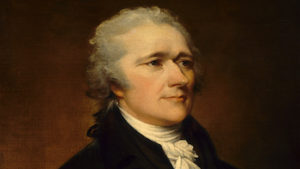
Alexander Hamilton
*Alexander Hamilton was born on this date in 1755. He was a white-American American revolutionary, slave owner, statesman, and Founding Father of the United States.
Alexander Hamilton was born out of wedlock in Charlestown, Nevis, West Indies. He was orphaned as a child and taken in by a prosperous merchant. Hamilton spent his teenage years working as a clerk with the St. Croix trading firm Beekman and Crude. Here, he would inspect and price enslaved Africans before the auction. Soon, local patrons sent him to New York to pursue his education. While a student, he wrote pieces supporting the Continental Congress, published under a pen name, and addressed crowds on the subject.
He took an early role in the militia as the American Revolutionary War began in the New York and New Jersey campaigns. After the war, he was elected as a representative from New York to the Congress of the Confederation. He resigned to practice law and founded the Bank of New York before returning to politics. Hamilton led the Treasury Department as a trusted member of President Washington's first cabinet. To this day, he remains the youngest U.S. cabinet member to take office since the beginning of the Republic. He opposed administration entanglement with the series of unstable French revolutionary governments.
Hamilton was a leader in seeking to replace the weak confederal government under the Articles of Confederation; he led the Annapolis Convention of 1786, which spurred Congress to call a Constitutional Convention in Philadelphia, where he served as a delegate from New York. He helped ratify the Constitution by writing 51 of the 85 installments of The Federalist Papers, one of the most important references for Constitutional interpretation. His Federalist Paper 54 speaks to his view that enslaved Africans were not human but were property. Hamilton's views became the basis for the Federalist Party, which was opposed by the Democratic-Republican Party led by Thomas Jefferson and James Madison. In 1795, he returned to the practice of law in New York.
He called for mobilization under President John Adams in 1798–99 against French First Republic military aggression. He was commissioned as Commanding General of the U.S. Army reconstituted, modernized, and readied for war. The army did not see combat in the Quasi-War, which was fought entirely at sea, and Hamilton was outraged by Adams' diplomatic approach to the crisis with France. His opposition to Adams' re-election helped cause the Federalist Party's defeat in 1800. Jefferson and Aaron Burr tied for the presidency in the electoral college, and Hamilton helped to defeat Burr, whom he found evil, and to elect Jefferson despite philosophical differences.
Hamilton led a conflicting lifestyle regarding slavery. He is not known to have enslaved people, although his family did. At the time of her death, Hamilton's mother had written a will leaving them to her sons; however, due to their illegitimacy, Hamilton and his brother were held ineligible to inherit her property and never took ownership of her slaves. One of Hamilton's grandsons interpreted some of these journal entries as being purchases for himself. His son John Church Hamilton maintained the contrary in the 1840 biography of his father: "He never owned a slave; but on the contrary, having learned that a domestic whom he had hired was about to be sold by her master, he immediately purchased her freedom."
Hamilton was active during the Revolutionary War in trying to raise black troops for the army with the promise of freedom. In the 1780s and 1790s, he generally opposed pro-slavery southern interests, which he saw as hypocritical to the values of the American Revolution. In 1785, he joined John Jay in founding the New York Society for Promoting the Manumission of Slaves and Protecting Such of Them as Have Been, or May be Liberated, the main anti-slavery organization in New York. The Manumission Society successfully promoted the abolition of the international slave trade in New York City. It passed a state law to end slavery in New York through a decades-long process of emancipation, with an end to slavery in the state on July 4, 1827.
When most white leaders doubted the capacity of blacks, Hamilton believed slavery was morally wrong and wrote that "their natural faculties are as good as ours." Unlike contemporaries such as Jefferson, who considered the removal of freed slaves (to western territory, the West Indies, or Africa) to be essential to any plan for emancipation, Hamilton pressed for emancipation with no such provisions. Hamilton and other Federalists supported Toussaint Louverture's revolution against France in Haiti, which had originated as a slave revolt.
Hamilton's suggestions helped shape the Haitian Constitution. In 1804, when Haiti became the Western Hemisphere's first independent state with a majority Black population, Hamilton urged closer economic and diplomatic ties. Hamilton continued his legal and business activities in New York City and was active in ending the legality of the international slave trade. Vice President Burr ran for governor of New York State in 1804, and Hamilton campaigned against him as unworthy. Taking offense, Burr challenged him to a duel on July 11, 1804, in which Burr shot and mortally wounded Hamilton, who died the following day on July 12, 1804.